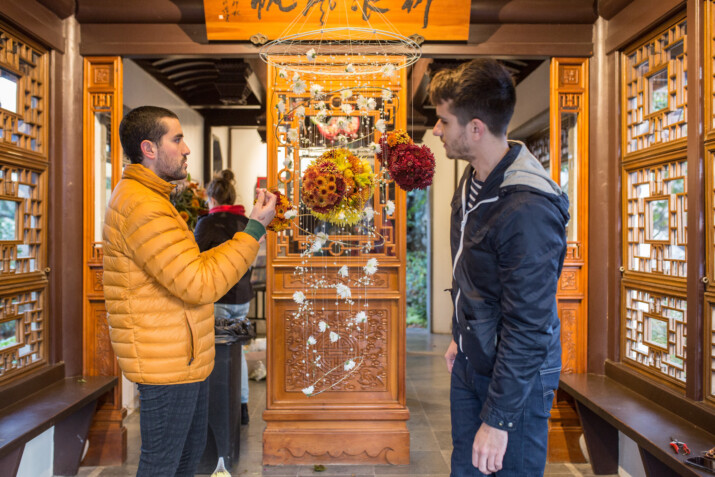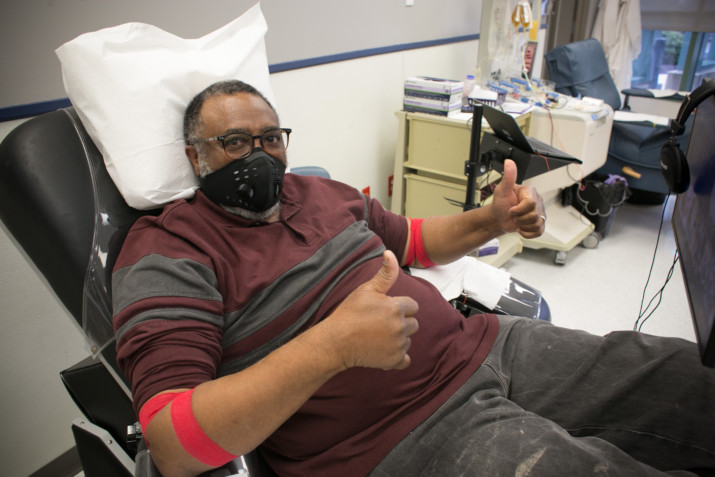
Red Cross Blood Donors Can Learn if They Have COVID-19 Antibodies
Portland, OR. The American Red Cross tests every blood donation for a variety of infections. All blood, platelet, and plasma donations are tested for COVID-19 antibodies. Will the antibody test become an incentive for people to give blood? The Red Cross hopes so. The organization needs donations, particularly convalescent plasma from COVID-19 Survivors.
The American Red Cross is currently urging eligible COVID-19 survivors to give convalescent plasma to help patients battling the virus and can have access to all potentially lifesaving treatments. Convalescent plasma is a type of blood donation, collected from individuals who recovered from COVID-19, that contains antibodies.
Communications Director, April Phillips, explains why convalescent plasma is needed. “We know right now we are seeing a surge of COVID-19 cases across the country and as the number of COVID-19 cases increases, so does the need for convalescent plasma. In fact, our distributions of convalescent plasma to hospitals had increased 250% in November compared to September, and that number continues to rise.”
According to Phillips, if someone is positive for COVID-19 antibodies, this means that they’ve had been exposed to the virus at some point and their body has built up antibodies to help them fight the virus. This doesn’t confirm any sort of immunity, but the plasma from their blood could potentially be helpful to patients who are currently fighting the virus.
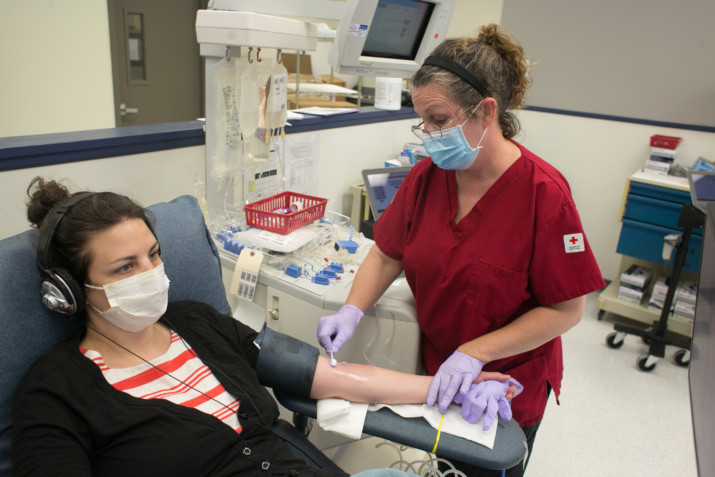
On May 29, 2020, in Rockville, Maryland, a Red Cross phlebotomist April Hall works with a donor of convalescent plasma Alisha Wolf. Wolf discovered she was Covid-19 positive while in the hospital to deliver her baby (everyone is now healthy). Photo by Dennis Drenner/American Red Cross
The American Red Cross is testing all blood donations for COVID-19 antibodies and is collecting convalescent plasma at more than 170 locations throughout the country. COVID-19 survivors who donate their plasma have the ability to help up to four patients recover from the virus.
Currently, the American Red Cross is experiencing a shortage of type AB and B convalescent plasma and is asking people who know that they have COVID-19 antibodies to sign up, to donate convalescent plasma, or donate whole blood. Type AB plasma is the only universal plasma type and can be given to patients of any blood type. Individuals interested in donating convalescent plasma can do so by clicking this link.
There are also new safety precautions in place when donating blood. People are required to wear a fabric covering (mask), a temperature check is required and there will be hand sanitizing stations set up throughout the whole time at a blood drive.
Eligible convalescent plasma donors can give with the Red Cross every seven days for up to three months. To be eligible to give convalescent plasma an individual must be:
- In good health and generally feel well.
- Have a prior, verified diagnosis of COVID-19, but are now symptom-free and fully recovered from COVID-19 and at least 14 days from the last date of symptoms.
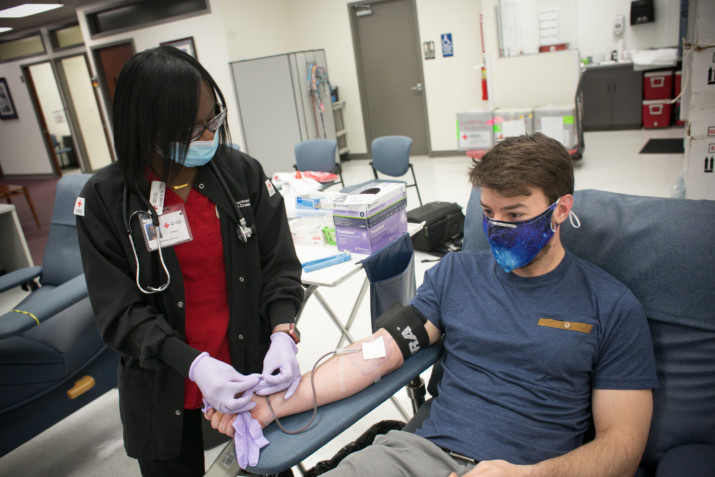
On April 24, 2020, in Baltimore, Maryland, a Red Cross phlebotomist collects lifesaving blood products during the COVID-19 outbreak while working a shift at the Mount Hope Blood Donation Center. Photo by Dennis Drenner/American Red Cross
Individuals must meet all regular blood donation requirements plus some additional criteria. Individuals who have fully recovered from COVID-19 and would like to help should first complete a Donor Request form online. If they are eligible to give, an American Red Cross representative will contact them to schedule a donation appointment at a Red Cross or another blood collection organization facility.
Donating convalescent plasma is different from a whole blood donation; the plasma is donated using an apheresis process where blood is drawn from one arm and sent through a high-tech machine that collects the plasma and then safely and comfortably returns red cells and platelets back to the person. This process is longer than donating whole blood and does take more time.
Phillips’ aunt this past summer received convalescent plasma while hospitalized for COVID-19 and encourages others to donate plasma. “You just don’t know, what your donation could mean to the family and to the person who’s been battling coronavirus, it’s a little bit of time, but it could make a world of difference for a patient.”
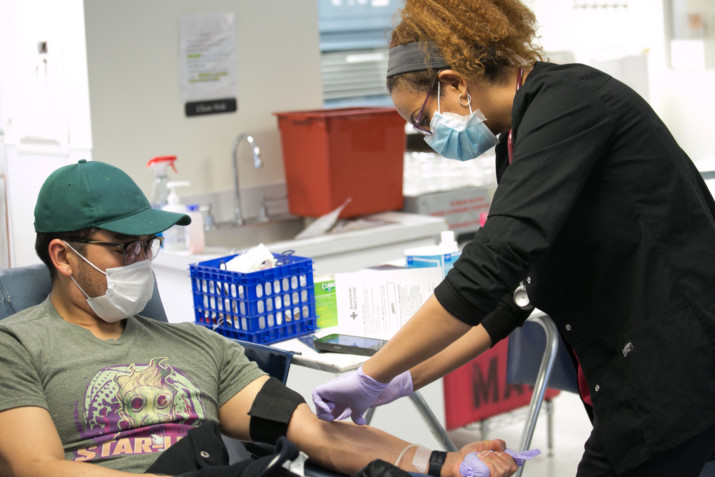
On April 22, 2020, in Rockville, Maryland, a Red Cross blood donor rolls up a sleeve to give blood during the COVID-19 outbreak at the Rockville Donation Center in Maryland. Photo by Dennis Drenner/American Red Cross
Thousands of American Red Cross drives have been canceled as community organizations and businesses are restricting access to many locations. The need for blood is constant; individuals who don’t have COVID-19 but would like to still help can do so by donating their blood or host a drive to help ensure a stable blood supply during the pandemic.
More research is needed before definite conclusions can be drawn; however, the American Red Cross is aware of several studies and articles that found a correlation between blood type and susceptibility to COVID-19. There is some evidence that shows lower COVID-19 infection rates for those with blood type O.
From the American Red Cross website: The American Red Cross prevents and alleviates human suffering in the face of emergencies by mobilizing the power of volunteers and the generosity of donors.










